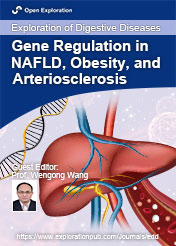-
 Special Issue Topic
Special Issue TopicGene Regulation in NAFLD, Obesity, and Atherosclerosis
Submission Deadline: December 31, 2023Guest Editor
Prof. Wengong Wang E-Mail
Professor, Department of Biochemistry and Biophysics, Peking University Health Science Center, Beijing, China
Research Keywords: Aging, NAFLD, vascular inflammation and atherosclerosis, lipid metabolism
About the Special Issue
NAFLD and obesity are gradually increasing worldwide and becoming heavy burden for human health. They are also well recognized as risks for other metabolic disorders such as type II diabetes, hyperlipidemia, and atherosclerosis. Excessive intake of dietary fat as well as abnormal lipid synthesis, oxidation, and transport, is closely linked to the occurrence and progression of NAFLD and obesity. Although the mechanisms underlying are not fully understand, the alterations of levels or function of the factors involving in lipid metabolism by different diet suggest the importance of gene regulation in NAFLD and obesity.
The expression of the important factors in NAFLD and obesity could be regulated at DNA (or epigenetic), transcriptional, post-transcriptional, post-translational, and other levels. Investigation into the mechanisms controlling the expression of these factors at above levels is not only important for better understanding of lipid metabolism and related diseases, but also important for providing targets for specific intervention.
Based on above backset, the present special issue set out to organize and publish articles including but not limited to reviews, original articles, and perspectives regarding the gene regulation in NAFLD, obesity, atherosclerosis, and other lipid-related disorders.
Keywords: gene regulation, NAFLD, obesity, atherosclerosis, diabetes, dietary intervention, interventions targeting specific regulators or factors
Call for Papers
Published Articles
-
-
Ongoing Special Issues
-
Completed Special Issues